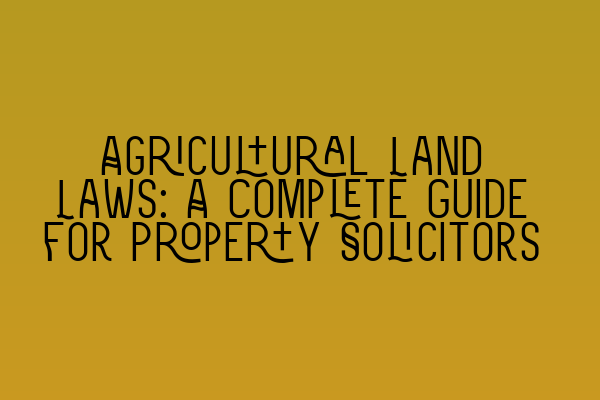Agricultural Land Laws: A Complete Guide for Property Solicitors
Introduction:
As a property solicitor, it is essential to have a comprehensive understanding of agricultural land laws. Agricultural land has its own set of regulations and complexities that require specialized knowledge. This guide will provide you with a complete overview of agricultural land laws, covering key aspects that every property solicitor should be familiar with.
1. Definition and Classification of Agricultural Land:
Agricultural land refers to land that is primarily used for farming or agricultural purposes. It includes both arable land for crop cultivation and grazing land for livestock. Understanding the classification of agricultural land is crucial, as it determines the rights and restrictions associated with the property.
2. Tenancy Agreements and Farm Business Tenancies:
Tenancy agreements play a significant role in agricultural land law. It is crucial to be well-versed in the different types of agricultural tenancies, such as farm business tenancies (FBTs) and agricultural holdings. Familiarize yourself with the key provisions and obligations that govern these agreements, including rent, repairs, and termination rights.
3. Common Agricultural Policy (CAP) and Subsidies:
The Common Agricultural Policy (CAP) is a coherent framework for agricultural support and funding across the European Union. Although the UK has now left the EU, it is essential to understand the impact of CAP and any transitional arrangements on agricultural land. Moreover, you should be aware of the various subsidies and grants available to farmers and landowners and how they may influence land transactions and investments.
4. Environmental Considerations:
Agricultural land interacts with the natural environment, making it necessary to consider various environmental factors. Familiarize yourself with environmental regulations that apply to farming practices, such as land drainage, water pollution, and wildlife protection. Being knowledgeable about these aspects will enable you to provide comprehensive advice to clients regarding land use and compliance.
5. Planning and Development Potential:
Agricultural land often presents opportunities for development, such as residential or commercial construction projects. Understanding the planning process and regulations that govern development on agricultural land is crucial. This includes knowledge of permitted development rights, planning permissions, and any restrictions that may apply due to green belt designations or other protected land categories.
6. Agricultural Land Relief and Taxation:
Tax implications related to agricultural land can significantly impact property transactions. Understanding the potential benefits of agricultural land relief, which reduces the inheritance tax on agricultural assets, is essential. It is also important to be familiar with Capital Gains Tax (CGT) reliefs available to farmers and landowners when disposing of agricultural land.
7. Agricultural Holdings Act 1986 and Succession:
The Agricultural Holdings Act 1986 provides specific rules for the succession of agricultural tenancies. It is crucial for property solicitors to have a thorough understanding of these rules, including the requirements for succession, notice periods, and potential disputes that may arise during the succession process. This knowledge will facilitate the handling of cases involving agricultural tenancies.
Conclusion:
Agricultural land laws form a crucial part of a property solicitor’s expertise. This complete guide has provided you with the essential information needed to navigate the complexities of agricultural land transactions. By familiarizing yourself with the definition and classification of agricultural land, tenancy agreements, environmental considerations, planning and development potential, taxation, and the Agricultural Holdings Act 1986, you will be well-equipped to assist clients in matters involving agricultural land.
Remember, staying up-to-date with the latest developments and legal updates is vital to providing excellent service in agricultural land law. Stay informed, remain proactive, and continue expanding your knowledge to support your clients effectively.
For further resources and support to enhance your property law expertise, consider exploring the following links:
– SQE 1 Practice Exam Questions
– SQE 1 Practice Mocks FLK1 FLK2
– SQE 2 Preparation Courses
– SQE 1 Preparation Courses
– SRA SQE Exam Dates
Remember, continuous learning is key to success in the ever-evolving landscape of property law.
